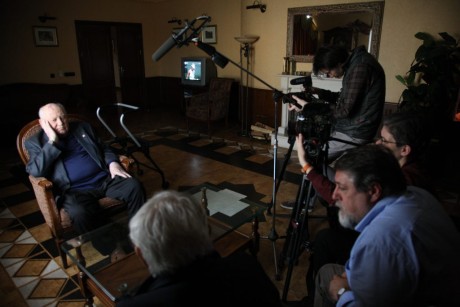


IDFA Final Competition Selections

I saw (most of) the IDFA press conference, 2 hours!, with artistic director Orwa Nyrabia on stage in de Balie on Leidseplein, which used to be the main meeting place for IDFA. Nostalgia! Nyrabia presented the sections, also those that are not competitive with – for some films – clips. And he presented the juries and he is good in talking briefly and warmly about the chosen films. There are all together 258 titles for the festival that starts November 18 and goes on until December 6. And here is a quote from Nyrabia:
”The IDFA 2020 program tells us, without doubt or hesitation, that documentary art is just essential, relevant, and meaningful. Here’s a more inclusive program than ever, a program that takes us a step further from the overwhelming immediate moment and shows us a larger worldview. It protects our sanity and helps us find balance in the middle of all the chaos”. Words from a festival director, who is not afraid of expressing passion. Thank you!
And the films… Let me mention some from the competition programs, films I know from when they were on a project stage and filmmakers I know and expect a lot from.
Feature length: Of course Vitaly Mansky’s “Gorbachev. Heaven”, 100 minutes (photo from the shooting) – “Mikhail Gorbachev, the 89-year-old former leader of the Soviet Union, receives Russian filmmaker Vitaly Mansky at his house just outside Moscow. In a light and pleasant atmosphere, weighty topics come up for discussion, as Gorbachev looks back over his life.”
And Milo Rau’s “The New Gospel” from Matera in Italy, setting up a play with immigrants. Rau, theatre director, was the one behind “Congo Tribunal”. And I can’t wait to see “Le Temps Perdu” by Argentinian Maria Alvarez, “A group of now-aging Marcel Proust fans have been meeting at a cafe in Buenos Aires since 2001, to read his seven-volume classic In Search of Lost Time. This black-and-white film documenting the reading sessions is an oasis of calm, intimacy, and depth in a modern world dominated by speedy online communications and innovation.” Since 2001! Wow!
First Appearance: Many, many years ago, in a workshop in Bucharest a young man Adrian Pirvu presented a film proposal: “A remarkably frank account of an attempt to get a grip on life. The first question is “When did it all start?” With the Chernobyl nuclear disaster, perhaps? When it happened, Adrian Pirvu’s mother was nearby and pregnant with him. She believes that’s why he is almost blind in one eye. Adrian is lonely and angry, and he hopes to find purpose in his life before he turns 30. So he decides to make a film in Ukraine about other people affected by Chernobyl. That’s how he meets Helena, which turns his world upside down. A new beginning?”. Actually Helena was not in his world by that time but his presentation and passion was convincing all of us in the workshop that here is a film. Alexandru Solomon, Hi Film, stepped in with his production company and now Deckert Distribution is taking care of distribution. Oh, I am so curious to see how the film ended up. “Everything Will Not be Fine”.
The same goes for “This Rain Will Never Stop” by Ukranians Alina Gorlova and producer Maksym Nakonechnyi, super talented young filmmakers, who have presented several versions of the film at different workshops. I remember Gorlova’s “No Obvious Signs” that we gave 5 pens on this site. Here she comes with a family story including locations in Ukraine, Syria, Germany, Iraq.
Mid-Length: I thought I knew the filmography of master Helena Třeštíková with whom I have spent many good festival hours, in Belgrade and last time in Helsinki. But there she is again with a world premiere, “Anny”, who “ didn’t become a sex worker till she was 46, but since then, she’s kept returning to the streets of Prague, rain or shine, as cars pass by at a snail’s pace. Helena Třeštíková’s film crew also kept returning to Anny in the years from 1996 to 2012.” Amazing how many films Třeštíková has made at the same time…
Archive: Bravo for having, for the second time, a section for films that use archive material in a creative way. 10 films compete, including Rithy Panh with his “Irradiated”, where he invites the audience “to become witnesses to human evil in an overwhelming, three-screen meditation on the mechanisms of violence” I had big problems watching it, should I give it another chance? And of course I am – as a lover of Paris and everything related to French culture and art – interested in watching Ulrike Ottinger’s “Paris Calligrammes”.
At the press conference I saw a clip from the opening film, “Nothing but the Sun” by (copy-paste from the press release) “Paraguayan-Swiss director Arami Ullón. A quietly earth-shattering film, Nothing but the Sun lucidly contrasts the hot, arid atmosphere of Paraguay’s Chaco region with the devastating stories of the Ayoreo people, an indigenous community violently uprooted from their ancestral territory by white missionaries. Between past and present, forest and desert, folk songs and church hymns, Ullón’s poetic feature lays bare the raw emotions of the human condition, seen through a culture on the brink of disappearing, but not without a voice.”
The clip took me by the heart. I will watch it, alas not in Amsterdam but at home on my computer.
On your computers you can already now see trailers from several of the films in competition. Like the one for Iranian Firouzeh Khosrovani’s ”Radiograph of a Family” that competes in feature length section and in the archive category. Fantastic trailer, an invitation to see the whole film, indeed! That’s what a trailer should do.